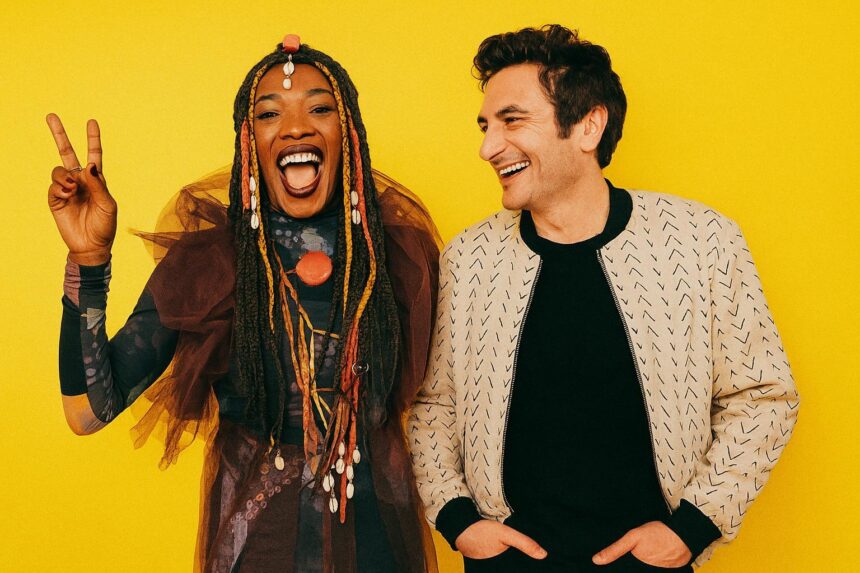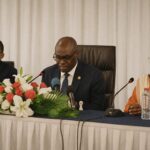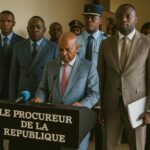A Polyphonic Caravan Redefining Regional Influence
When Malian kora virtuoso Toumani Diabaté and French producer-guitarist Matthieu Chedid first convened the Lamomali collective in 2017, the project was hailed as a genre-bending experiment. Six years later the ensemble returns with Totem, a second opus whose touring schedule now maps an ambitious cultural corridor from Dakar to Libreville, with Brazzaville strategically positioned as an early showcase. The itinerary is less a succession of concert dates than a roaming symposium on African modernity: each performance stitches together Sahelian string traditions, Gulf of Guinea Afrobeats and Congolese rumba inflections, suggesting a coherent sonic diplomacy that complements, rather than competes with, conventional statecraft.
- A Polyphonic Caravan Redefining Regional Influence
- Congolese Artistry Anchoring Soft-Power Narratives
- Entrepreneurial Synergies and Market Realities
- Audience Reception and Symbolic Capital
- Governance Context and Cultural Policy Alignment
- Strategic Implications for Continental Integration
- Prospects for Future Cultural Connectivity
Congolese Artistry Anchoring Soft-Power Narratives
Congo-Brazzaville’s contribution to the line-up is personified by Makhalba Malechek, whose single Le Séisme has enjoyed robust streaming figures across Francophone Africa. His inclusion answers two concurrent objectives articulated by Brazzaville’s Ministry of Culture: to cultivate export-ready creative industries and to reposition the country as a convener of pan-African dialogue. Although the Republic’s foreign policy is often analysed through the prisms of oil diplomacy and multilateral peacekeeping, its cultural assets are proving equally persuasive. Government facilitations—ranging from streamlined visas for touring personnel to the underwriting of rehearsal spaces at the Institut Français du Congo—demonstrate a calibrated willingness to harness music as a vector of influence without lapsing into overt propaganda.
Entrepreneurial Synergies and Market Realities
Behind the artistic enthusiasm lies a sophisticated commercial architecture. According to data compiled by the Pan-African Music Market Observatory, live-touring revenues on the continent rebounded to ninety-two percent of their pre-pandemic benchmark in 2023. Totem’s promoters have secured tiered sponsorships from telecommunications consortia and regional airlines, reflecting a recognition that cultural events deliver measurable returns in brand loyalty. Brazzaville’s Maya-Maya Airport, freshly expanded with concessional financing from Chinese lenders, reported a seven percent uptick in passenger traffic during the ensemble’s two-night residency—anecdotal yet illustrative evidence that cultural programming dovetails with broader economic diversification targets heralded in Congo’s National Development Plan 2022-2026.
Audience Reception and Symbolic Capital
Field interviews conducted by researchers at the University of Kinshasa’s Centre for Music and Society revealed a tripartite motivation among concert-goers: aesthetic appreciation, pan-African solidarity and curiosity toward cross-genre experiment. Patrons repeatedly cited the performative dialogue between Makhalba Malechek and Burkina Faso’s Smarty on the track Chacun Sa Vie as emblematic of an Africa that negotiates its differences through artistic collaboration rather than adversarial posturing. Such reception is not merely anecdotal; it furnishes policymakers with qualitative evidence that soft-power investments can consolidate public goodwill across borders.
Governance Context and Cultural Policy Alignment
President Denis Sassou Nguesso has long maintained that culture functions as the republic’s “third diplomatic rail,” complementing political engagement and economic integration. The 2021 creation of the National Fund for the Promotion of Arts and Letters endowed performers with micro-grants tied to export potential, a mechanism praised in the latest UNESCO Creative Economy Report for its transparency relative to regional benchmarks. Observers note that the administration’s cultural overtures have avoided the trappings of personality cult, focusing instead on institutional durability. Within this framework, Lamomali’s tour operates less as a state-sponsored roadshow than as a public-private partnership that aligns with national objectives while preserving artistic autonomy.
Strategic Implications for Continental Integration
The African Continental Free Trade Area, formally operational since 2021, underscores the imperative of harmonising intellectual property regimes and easing professional mobility—both critical for touring artists. Lamomali’s logistical footprint offers a tangible stress-test of these regulatory commitments: customs clearance for kora instruments in Lomé was processed in forty-eight hours, whereas analogous paperwork consumed twice as long during a 2018 tour, indicating incremental progress. By embodying the normative aims of the AfCFTA in real time, the ensemble supplies policymakers with a living laboratory whose data—travel times, tariff codes, digital royalties—can inform subsequent rounds of protocol negotiation.
Prospects for Future Cultural Connectivity
As the Totem tour weaves its final cadence, stakeholders are already contemplating successor projects. Discussions are under way for a residency in Oyo, the Congolese riverside town that hosts the biennial Festival Panafricain de Musique. Such an initiative would buttress Brazzaville’s ambition to evolve from ephemeral host to permanent hub, a strategy that aligns with forecasts by the African Development Bank identifying creative industries as a twenty-billion-dollar growth vector by 2030. If realised, these plans could institutionalise the very synergies that Totem has catalysed, ensuring that the music outlasts the applause and anchors a durable architecture of regional engagement.



















